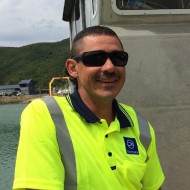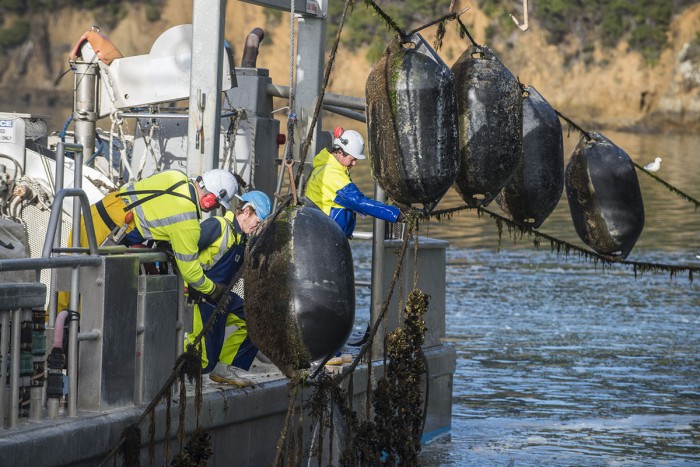Aquaculture Farmer
Kaiahumoana
Alternative titles for this job
Aquaculture farmers manage the breeding, raising and harvesting of fish and shellfish for commercial purposes in marine or freshwater farms.
Pay
Aquaculture farmers with one to three years’ experience usually earn
$49K-$65K per year
Aquaculture farmers with more than three years’ experience usually earn
$59K-$88K per year
Source: Aquaculture NZ, 2021.
Job opportunities
Pay
Pay for aquaculture farmers varies depending on skills, experience and the type of work they do.
- Aquaculture farmers with one to three years' experience usually earn between minimum wage and $65,000 a year.
- Aquaculture farmers with more than three years' experience, or in supervisory roles, can earn between $59,000 and $88,000.
Source: Aquaculture New Zealand, 2021.
- PAYE.net.nz website - use this calculator to convert pay and salary information
- Employment New Zealand website - information about minimum wage rates
(This information is a guide only. Find out more about the sources of our pay information)
What you will do
Aquaculture farmers may do some or all of the following:
- tighten, clean and mend lines, ropes, racks and nets on aquaculture farms
- feed and care for growing fish and shellfish
- harvest and pack fish or shellfish
- dive to clear any debris or dead fish from fish pens
- drive and navigate boats
- operate underwater net cleaning machines and remote operated vehicles (ROVs)
- maintain marine farm equipment
- plan work schedules and prepare budgets
- keep records on growth and health of fish or shellfish
- train, supervise, manage and assess staff.
Skills and knowledge
Aquaculture farmers need to have:
- knowledge of how to grow and harvest fish or shellfish
- practical skills such as being able to tie knots and connect ropes
- boat-handling and navigational skills, including the ability to read charts and use a compass
- basic mechanical skills
- ability to maintain equipment on farms including repairing broken lines
- awareness of health and safety practices.
Diving skills are also recommended.
Working conditions
Aquaculture farmers:
- often work more than 40 hours a week, and may work weekends
- usually work a set number of days, then have the same number of days off
- work in rural areas, coastal and open waters, or holding ponds and tanks
- sometimes work in challenging weather conditions.
What's the job really like?

David Horton
Aquaculture Farmer
No day is the same
The forces of nature mean that no day is the same for David Horton, who works as the skipper of a farming vessel. He says there is always something new to accomplish.
"I love being out on the mussel farms. We start early and finish late, making the most of the weather and the work that has to be done. I have to think on my feet, with the responsibility of a vessel and crew to keep safe.
"Working four days on, four days off means I can give it 100 percent for the days I’m on. It also gives me a great work-life balance with plenty of time for community, family and recreation."
Opportunities for development
David is grateful for the development opportunities he has had through working in aquaculture.
"One of my proudest moments was being promoted to skipper after I completed my training. The training did present some obstacles – I was not the greatest at school. But because this was really important to me I used all my knowledge, together with internal and external support, to overcome those obstacles."
Attitude is crucial
If you’re interested in a career in aquaculture, the right attitude is crucial, says David.
"There are jobs and opportunities for everyone who wants them. If you have enthusiasm, drive and energy give it a go."
Entry requirements
There are no specific requirements to become an aquaculture farmer. However, an aquaculture qualification, such as a New Zealand Certificate in Aquaculture (Level 3 or 4), may be useful.
Managers or supervisors working on boats need to have a skipper restricted limits (SRL) certificate (Maritime New Zealand's licence to operate as a captain/skipper).
A diving qualification may also be required on some farms.
- NMIT website - information about the New Zealand Certificate in Aquaculture
- Maritime New Zealand website - information about the skipper restricted limits certificate
- Worksafe New Zealand website - information on occupational diving
Secondary education
There are no specific secondary education requirements to become an aquaculture farmer. However, biology and maths may be useful.
Personal requirements
Aquaculture farmers need to be:
- able to follow instructions
- able to work well independently or in a team
- good communicators
- reliable
- well organised.
Useful experience
Useful experience for aquaculture farmers includes:
- fishing, farming and horticulture work
- shellfish processing
- work with or on boats
- diving
- work outdoors.
Physical requirements
Aquaculture farmers need to be reasonably fit and strong as the job can involve heavy lifting. They also need to be comfortable working on water.
Aquaculture farmers who work as skippers should also have normal colour vision to meet Maritime New Zealand requirements.
Find out more about training
- Nelson Marlborough Institute of Technology (NMIT)
- 0800 422 733 - info@nmit.ac.nz - www.nmit.ac.nz
What are the chances of getting a job?
Demand for aquaculture farmers good
Opportunities for aquaculture farmers are good because the number of aquaculture farms is increasing and employers can find it hard to fill vacancies.
According to Aquaculture New Zealand, about 750 mussel farms, 150 oyster farms, and 25 salmon farms currently operate in New Zealand, employing around 1,000 people.
According to the Census, 405 aquaculture farmers and 228 aquaculture workers worked in New Zealand in 2018.
Three main employers of aquaculture farmers
Most aquaculture farmers work for one of three main employers:
- New Zealand King Salmon, which operates farms in the Marlborough Sounds, and produces about two-thirds of the country's farmed salmon.
- Sanford, which has mussel farms in Coromandel and Havelock, and king salmon farms in Kaitangata and Stewart Island.
- Moana New Zealand, which operates oyster farms across the North Island and top of the South Island, a hatchery and nursery in Nelson, and a blue abalone farm in Ruakaka.
A number of smaller businesses also operate throughout New Zealand in regional towns.
Sources
- Boyd, D, floating and farm development manager, Sanford Limited, careers.govt.nz interview, March 2018.
- Burdass, M, aquaculture programme coordinator, Nelson Marlborough Institute of Technology, careers.govt.nz interview, June 2018.
- Jeffs, A, professor of marine science, University of Auckland, careers.govt.nz interview, June 2018.
- Mant, K, programme support specialist, Aquaculture New Zealand, careers.govt.nz interview, January 2021.
- Moana New Zealand, careers.govt.nz interview, April 2018.
- Preece, M, chairperson, New Zealand Salmon Farmers Association, careers.govt.nz interview, March 2018.
- Stats NZ, '2018 Census Data', 2019.
(This information is a guide only. Find out more about the sources of our job opportunities information)
Progression and specialisations
Aquaculture farmers may progress to work as managers or supervisors.
With further training, they may also progress to become fishing skippers.
Last updated 27 March 2025

